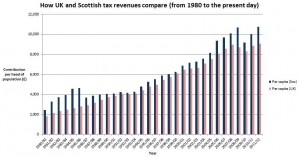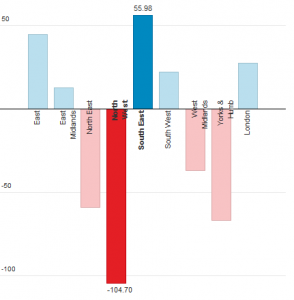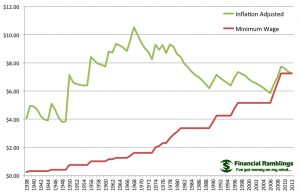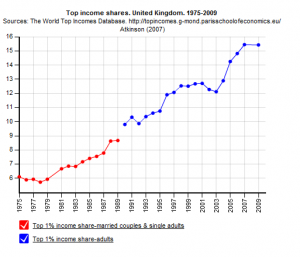Vote No on 18th September if you’d like…
• Scottish funding slashed by £1,364 per person
• A country for the few, not the many
• Tax cuts for the rich, pay cuts for the rest of us
• The introduction of Tuition Fees
• NHS Cuts
• To leave the EU
Dear Fellow Scot,
We, the people of Scotland, have a difficult decision to make on 18th September. And it is a difficult decision.
Alistair Darling and his No campaign want you to believe it’s easy. They want you to believe this is a simple case of “risky” independence verses the safety of the Union.
But he’s not telling you about the very real risks of staying within the UK.
Such as…
The Scottish budget could be cut by £7,220,000,000
Just last month, “The Future of England Survey” report – commissioned by YouGov – was published. This report was described by The Scotsman as, “the most detailed picture yet of how England would regard a post-referendum Scotland”.
The study found that 56% of people in England believe “public spending in Scotland should be reduced to the UK average following a No vote”.
That would be a cut of £1,364 per person – a total cut of £7.22 billion pounds a year.
That’s money that we currently get as a result of the Barnett formula. And most English people want that formula scrapped.
What are politicians saying about this?
It’s no surprise that the three Westminster party leaders are all denying there’ll be cuts – after all, they don’t want to harm the No Campaign.
But their denials are hard to believe.
Let’s start with the Tories…
In 2008 – when it looked like there could never be an independence referendum – David Cameron said the Barnett Formula should be replaced. He said, “This cannot last forever, the time is approaching…”
Asked if that means the formula is coming to the end of the road, he replied: “Yes, that’s right…”
OK, David Cameron could lose his job at the next election. So what does Boris Johnson, the Bookies’ favourite to be the next Tory leader, think?
Here’s what he wrote in the Telegraph: “You may be familiar with the Barnett formula, a system of amazing political antiquity by which the English taxpayer sends about £20 billion every year to Scotland as a kind of present.”
A “present”? Scotland contributes 9.9% of UK tax revenues, but receives just 9.3% of public spending.
And, since 1980/81 Scotland has contributed £222 billion more in tax revenues than if it had just matched the per capita contributions of the UK.

As you see, we’ve contributed more per person every single year.
Those are the facts. But the facts mean nothing to the likes of Boris Johnson, who are determined to believe “England earns and Scotland spends”.
OK, that’s the Tories, what about Labour?
Last September, Labour’s Shadow Scottish Secretary Margaret Curran said she believed the Barnett formula should be abolished.
That’ll be music to the ears of Labour’s Welsh First Minister Carwyn Jones. He’s also calling for the Barnett formula to be ditched. Mr Jones believes Wales is being short-changed by the formula.
Ed Miliband has agreed this needs to be looked into. If Mr Miliband supports the Welsh plan, that would mean a cut in spending for Scotland of around £4bn a year – roughly £750 per person.
What the experts are saying
Aberdeen University Professor David Heald – a House of Commons Treasury Adviser for 20 years – said there’d be “big pressure” to review Barnett if Scotland votes No.
He pointed out: “When people talk about the review of Barnett, they usually mean cutting Scotland’s spending, because they’ve already decided … that Scotland gets too much.”
And when asked if voters should trust Westminster promises on Barnett ahead of the referendum, Professor Heald said: “I would say no.”
This is a man who spent two decades in the belly of the beast, listening to what English politicians say about Scottish funding when there are no voters and no microphones around.
Cuts for the North of England
We’ve already seen the Tory/Lib Dem government slash spending in Labour strongholds in Northern England, while increasing spending in southern constituencies:

So all the evidence points one way: once independence is off the table, we’re going to see our budget cut. The only question is, by how much?
And, how are we going to feel, if we show loyalty to the Union only to be “rewarded” with the “present” of contributing 9.7% of the tax revenue, but only getting 8.1% of the spending?
NHS Cuts, the Bedroom Tax, Tuition Fees
If you agree our spending will be cut, the question is, what will be cut?
Again, we should look to what’s happening in England as our guide.
What do we see? We see cuts to the NHS. We see the Bedroom Tax. We see cuts to disability benefits. And we see cuts to further education that have resulted in sky-high tuition fees.
And these aren’t Tory cuts that will be reversed if Labour wins the next General Election. Ed Balls made that crystal clear last December when he said, “We will be cutting departmental spending in 2015-16 and not raising it, with no more borrowing to cover day-to-day spending.”
A country for the few, not the many
So, yes, it doesn’t matter who is in Downing Street next May, austerity is going to continue… but not for everyone.
Since 1979, Britain’s richest 1% have seen their slice of the pie almost triple:
Tax cuts for the rich, pay cuts for the rest of us
Do you know that, in the UK, the top 10% pay a lower tax rate than the bottom 10%?
It sounds unbelievable, I know, but it’s true. A household in the bottom 10% loses 43% to tax, while a household in the top 10% earnings only pays 35%.
How can this be?
It’s because the lowest-earning 10% of households pay an average of 23% in indirect taxes alone (for example, fuel taxes, VAT).
While, on the other side, successive governments have lowered taxes for the rich.
For the last 35 years, Westminster has followed an “American” economic model that’s based on helping the rich get richer, in the belief that the wealth will trickle down to the rest of society.
This hasn’t worked in America, where average wages have dropped by over 20% in real terms since the late 1960s.

American wages are more than 20% lower today than in 1968.
This is the world of zero hours contracts, low job security, and stagnant wages.
We’re already seeing this in the UK. (Wages aren’t keeping up with the true cost of living… in the last 30 years, house prices have gone up 50% faster than wages.)
But, we in Scotland haven’t voted for this – we’ve had it imposed on us by Westminster. Instead, we consistently voted for a fairer society with a smaller gap between rich and poor.
The only way we can guarantee we have that society is if we’re governed by the politicians we elect.
The real danger to our EU membership
What about EU membership, wouldn’t that be in danger if we went independent?
Actually, no. No-one is saying Scotland can’t get into the EU.
The EU President Jean-Claude Juncker supports Scotland’s membership. He’s on the record saying he’s sympathetic towards Scotland’s membership and “would not want Scotland to be kept out”
Even Alistair Darling’s most extreme doomsday scenario has us joining the EU after waiting a few years.
And, never forget English jobs, Welsh jobs, Northern Irish jobs, European jobs… depend on trade with Scotland. To suggest that we’ll be frozen out of European business is to suggest that turkeys would vote for Christmas.
So, even if there’s a delay, Scotland will be in.
But what about the rest of the UK?
A survey done late last year by the European Commission showed only 19% of Britons trust the EU.
Polls suggest the UK is split down the middle when it comes to leaving the EU.
The Tories have promised a European referendum if they’re elected. Labour has promised a referendum if any additional powers are transferred to Brussels.
So there’s likely to be a referendum – if not in the next 5 years, then in the next 10. And, when it happens, it’s 50-50 whether the UK will be out or in.
Voting Yes is the only way to ensure we’ll be in the EU in the long term.
What about oil?
In 1974, fearing Scottish Independence, Labour and the Tories colluded to cover up a report (known as the McCrone Report).
That report said an Independent Scotland would have a tax surplus so large, it would be “embarrassing”, making our country “as rich as Switzerland.”
Instead of revealing this truth, the politicians peddled a myth that said the oil would soon run out.
Here we are, 40 years later, with a sense of déjà vu.
The same parties are telling us the same thing: that our oil will soon run out. Should we trust them? Should we assume that, even though they lied about this before, they’re telling the truth now?
Of course, since the mid-1970s, a lot of oil and gas has been extracted. But don’t assume there isn’t more to be found.
As technology evolves, oil companies are able to find oil they couldn’t find before – and they’re able to profitably extract oil that would have been too costly to extract in the past.
For example, just three years ago, Norway discovered what it called “the largest oil strike of the last 30 years in the North Sea.”
So don’t be surprised if the estimates of £1trn worth of oil turns out to be well short of the mark.
The Certainties of Independence
Of course, choosing independence is a step into the unknown. Anyone who suggests it isn’t, is lying to you.
But, if we choose independence, there are some things that will be certain:
• We’ll keep our own tax revenue.
• We’ll be governed by whichever party we elect.
• We’ll set our own tax policies and decide what we think is fair.
• When we negotiate with the rest of Europe, we’ll be putting Scotland’s priorities first.
• We’ll be a member of the EU.
The No campaign cannot promise us any of these things. Because the only certainties come from shaping your own destiny.
Standing at the crossroads
Scotland is standing at the crossroads, and we have to choose a path.
If you, like me, believe the Scottish people are competent and capable, then we should not fear self-government.
We’ve proven we’re an ingenious race of hard-working over-achievers. TV, telephone, Radar, penicillin… the list is endless… all across the world, people’s lives are better because of Scottish inventions and discoveries.
And that spirit is alive today. Our tiny nation is amongst the leaders in genetics, in renewable energy, artificial intelligence. Thanks to our young people, our Universities are rated as amongst the best in the world.
The Union served a purpose that was good for both sides, but it’s turned into a loveless marriage. We saw that in 2007 when the tricentennial of the Union passed without celebration. (How many street parties did you go to?)
I believe now is the ideal time for Scotland to choose a path that suits Scotland. If you agree, then join me in voting “Yes” on 18th September.
Best wishes,
A Concerned Scot
PS We only got this referendum with Westminster’s permission. This is a once in a generation opportunity. We had a referendum in 1979. We voted no, and were rewarded with 18 years of Thatcherism – and suffered along with the rest of Northern Britain.
This time, let’s choose a destiny that puts Scotland first.
PPS If you, like me, are worried about the consequences of a No vote, please share this message with your friends.
